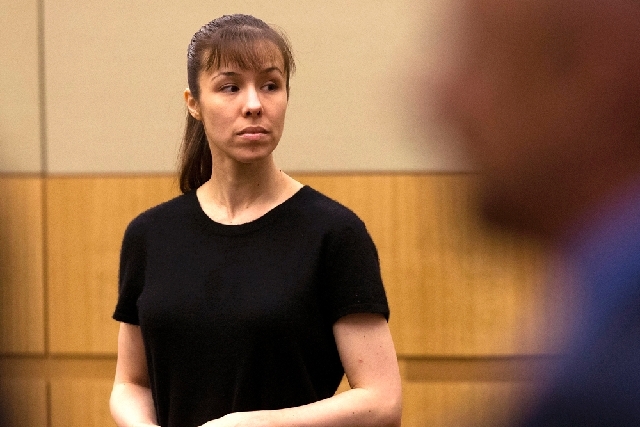Arias jury deadlocked but must continue

PHOENIX — Jurors in the Jodi Arias murder trial told the judge Wednesday that they are unable to reach a unanimous verdict on whether the convicted murderer should be get life or death for killing her boyfriend, prompting the judge to send them back to the deliberation room to work through their differences.
The jury reported its impasse after only about two and a half hours of deliberations that began Tuesday afternoon.
“I do not wish or intend to force a verdict,” Judge Sherry Stephens told the jurors before sending them back to continue their discussions. She instructed them to try to identify areas of agreement and disagreement as they work toward reaching a decision.
Under Arizona law, hung juries in the penalty phase of trials require a new jury to be seated to decide the punishment.
The panel heard emotional comments last week from the family of victim Travis Alexander as the prosecutor argued that the 32-year-old Arias should be executed for the gruesome killing.
Arias responded Tuesday by pleading for mercy, saying she can become a model prisoner who teaches inmates how to read and speak Spanish, and helps the prison launch recycling programs. She also wants to be an advocate for domestic violence victims.
The same jury of eight men and four women convicted Arias of first-degree murder two weeks ago in the death of Alexander, who was stabbed about 30 times and nearly decapitated in what authorities said was a jealous rage.
Arias spoke to The Associated Press and other media outlets in jailhouse interviews Tuesday night, just hours after the jury began deliberating her fate. She talked out about her murder trial, her many fights with her legal team and her belief that she “deserves a second chance at freedom someday.”
Arias said her lawyers let her down by not calling more witnesses who could have bolstered her claims that she was a victim of domestic violence at Alexander’s hands.
If the jury opts for a life sentence, the judge will have the option of determining whether Arias spends the rest of her days behind bars or is eligible for release after 25 years. Arias acknowledged it was unlikely she would ever be released, but believed she deserves another chance.
Following her conviction last week, she told a local TV station that she preferred the death penalty. She said Tuesday night that she changed her mind after a tearful meeting with family members the same day, realizing her death would only cause them more pain.
“I felt like by asking for death, it’s like asking for assisted suicide, and I didn’t want to do that to my family,” she told the AP.
Arias said she fought from the beginning to keep cameras out of the courtroom to limit the media spectacle, and believes the jury should have been sequestered. She stated flatly that she did not receive a fair trial.
“The prosecutor has accused me of wanting to be famous, which is not true,” she said.
However, Arias has sought the spotlight at every turn, providing TV interviews and even using a third-party to tweet throughout the trial.
Arias repeated her claims that she never wanted to go to trial in the first place but instead wanted to reach a deal with prosecutors on a second-degree murder count that would have carried a maximum of 22 years in prison. However, she said, “no deal was offered.”
She talked to reporters Tuesday after the judge lifted an order barring jail officials from accepting any media requests. The judge did not elaborate on the reason for the ruling, but Maricopa County Sheriff Joe Arpaio’s office quickly began arranging the interviews that lasted late into the night.